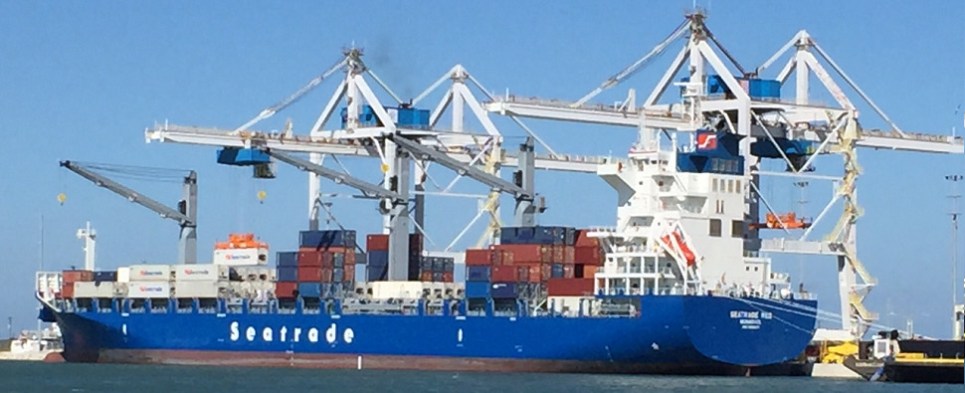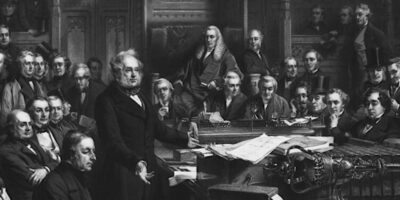A Completely Unnecessary Trade War
This was the week it finally happened, one of the strangest and least necessary impositions of government power over international trade to appear in decades, even during living memory.
The progress toward more open markets and the rule of law in international trade has been dramatically interrupted with hard-edged tariffs on imports of raw materials, a US action that is being met (inevitably) by retaliatory tariffs from the US’s most valuable trading partners.
Trade partners are out of words: outrageous, absurd, dangerous, damaging, capricious, illegal. The problem is not the art of the deal; the problem is the complete absence of dealing and the fallback to outright economic violence.
Why? That’s the question everyone on the planet is asking. White House Legislative Director Marc Short says that the real goal is a world without tariffs. That’s not really believable in light of White House actions so far.
The answer is something few are willing to face: Trump wants it this way. It’s the trade war of which he has dreamed since he first entered public life.
Why Now?
Historians of the future will look back to try to understand how this happened. The Smoot-Hawley tariffs of 1930, the ones that devastated the global economy, came about as a confused reaction to an economic crisis. Today’s tariffs, in contrast, emerge in times of economic recovery, extremely low unemployment, and signs of genuine growth.
The timing alone might mean that the worst effects of tariffs can be avoided. But let’s not be confused about cause and effect here. Economics consists in elucidating not only what is seen but also what is unseen. The tax we call a tariff is a wealth transfer from private hands to government, undoing the good effects of tax cuts.
Most of the damage is incalculable. It means losing the gains in wealth that would otherwise be realized had freedom prevailed. It subsidizes inefficiency and delays economic adjustments to market realities. It cuts off avenues for the expansion of the division of labor in a single nation and among many. We’ll never know what we missed.
The usual path of protectionism is to target finished goods from foreign nations. This way domestic industries face as little damage as possible. But Trump’s tariff package began at the other end, imposing higher costs on the importers of aluminum and steel and inviting foreign nations to retaliate against finished goods made in the US. This feature of the trade war has observers in all nations completely confused and even panicked over the seeming economic irrationality of the strategy.
The End Game
People are asking, what is the end game here? To reduce the “trade deficit?” Presidential statements harp on that number constantly. But reported figures are not only wildly inaccurate (“country of origin” is a fiction in a globalized world) but also irrelevant (there is no reason whatsoever why the dollar value of imports and exports should match).
Maybe the point is to extract concessions? One might think so but that opportunity has not been put forward in trade negotiations. There are no real deals being made here. All sit downs have proven pointless. US partners have come to realize, however gradually, that the end game has nothing to do with others’ policies; the real point is protectionism for its own sake.
How can we make sense of this?
For at least two years now I’ve done media interviews on the topic of Trump’s economic understanding. Each time, I’ve pointed out a fundamental truth that continues to elude people. If you follow the statements of Donald Trump going back decades, and look for a consistent theme all the way back to the 1980s, you discover that he does in fact have core beliefs.
The number one belief he carries is that international trade is a losing proposition for the US. All details aside, he is thoroughly convinced that mutual commercial dependencies with other nations are bad for the country. He believes that autarky – the economic self sufficiency of a geographic unit under the control of a unitary state – is good for the nation and its economy, so long as that state has breathing room (or Lebensraum, if you will).
This is not a random eccentricity. It stems from an ideological orientation that traces far back in history to pre-liberal times and made its ways through the 19th century as an overtly anti-liberal ideological position. Liberalism began in reaction to the religious wars and the divisions they entailed but the very next cause to break down was mercantilism: the doctrine that the wealth of a nation is guaranteed by maximizing exports and minimizing imports.
If every nation holds the mercantilist view, there is a problem. It means no end to conflict. It can mean war.
Listian Longings for War
Even after the victory of free trade in England and the Continent in the early 18th century, reaction was beginning to take hold. Friedrich List published The National System of Political Economy (1841), celebrating protectionism, infrastructure spending, and government control and support of industry. It was a direct attack on laissez faire and a celebration of the national unit as the only truly productive force in economic life.
This book had a massive influence in shifting people’s views on free trade, in both Germany and the United States. Today’s economic nationalists have nothing new to add to the edifice already constructed by List, which in turns was thoroughly refuted by Henry George among others. The point is that List’s views were not really economic; they were political. To this day, it is the same. Protectionism is not really an economic doctrine; it is a political strategy, focussed mostly on domestic rabble-rousing.
Trump, has never read List of course, but he has inherited this tradition of thought, which is ultimately about government power and national identity. It is an abuse of the commercial system of global trade to draft people’s economic relationships into the political ambition of, usually, one ambitious politician.
A Global Trend
But this is not only about US politics and Trump’s penchant for protectionism. We are seeing the rise of nationalism in Europe, Latin America, and other places in the world, as a last desperate cry to preserve political control against the tide of global integration, commercial harmony, and the cooperation among peoples of all nations.
I’ve recently been in several countries that are facing this political backlash against trade and international economic integration, and I repeatedly had people assure me that that policies of the government do not reflect the views of the people – exactly as I’ve had to assure many people abroad concerning the US.
Most of the people pushing this nationalist approach are brought into power in reaction to policies pushed by the center left that implausibly combine free migration, exclusionary labor controls, and a large-scale social-assistance state. This is a perfect recipe for public disgust against prevailing governments, and sets up the perfect storm for the rise of populist/nationalist leaders.
Square Peg, Round Hole
How many times must we go through this to see that this is the result of such policies? Large-scale welfare states embed a cultural ethos that regards the nation as a kind of family of caretakers of one another, and that in turn is based on a sense of empathy based on religion, language, race, and shared heritage. It’s an illiberal sense of nationhood and it doesn’t combine well with a liberal view toward global trade and immigration.
What we see today is an effort to preserve national collectivism amid the technology and economic reality of globalization, and it is defaulting to a kind of autocratic nativism that many people believed was long dead. Not so – not so long as we keep trying to shove the square peg of national unity into the round hole of diversity and the free movement of people and goods.
Meanwhile, we’ve got a genuine problem, a new crop of world leaders who are willing to sacrifice economic rationality, international cooperation, and world peace to feed their nationalistic political ambitions via the brute force of protectionism. Trump is leading the way.
We’ll get through this phase of political history – and it is just a phase because the trends toward globalization are too powerful to stop – but it’s going to be a bumpy ride.












